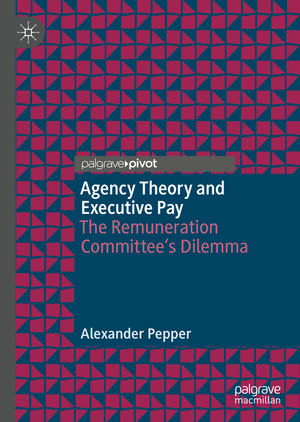Agency Theory and Executive Pay: The Remuneration Committee's Dilemma
Autor Alexander Pepperen Limba Engleză Hardback – 29 noi 2018
Preț: 417.68 lei
Nou
Puncte Express: 627
Preț estimativ în valută:
79.92€ • 83.66$ • 66.52£
79.92€ • 83.66$ • 66.52£
Carte tipărită la comandă
Livrare economică 31 martie-14 aprilie
Preluare comenzi: 021 569.72.76
Specificații
ISBN-13: 9783319999685
ISBN-10: 3319999680
Pagini: 134
Ilustrații: XI, 133 p. 8 illus.
Dimensiuni: 148 x 210 x 15 mm
Greutate: 0.33 kg
Ediția:1st ed. 2019
Editura: Springer International Publishing
Colecția Palgrave Pivot
Locul publicării:Cham, Switzerland
ISBN-10: 3319999680
Pagini: 134
Ilustrații: XI, 133 p. 8 illus.
Dimensiuni: 148 x 210 x 15 mm
Greutate: 0.33 kg
Ediția:1st ed. 2019
Editura: Springer International Publishing
Colecția Palgrave Pivot
Locul publicării:Cham, Switzerland
Cuprins
1. Agency Costs, Coordination Problems and the Remuneration Committee's Dilemma.- 2. What's Wrong with Agency Theory?.- 3. What a Public Corporation Really Is.- 4. Executive Pay as a Collective Action Problem.- 5. Behavioural Agency Theory.- 6. The Modern Corporation's Final Chapter.
Notă biografică
Alexander Pepper is Professor of Management Practice at the London School of Economics and Political Science, UK. He previously had a long career at PwC, where he was a global leader of PwC’s Human Resource Services consulting practice from 2002-2006. He has authored two books, Senior Executive Reward (2006), and The Economic Psychology of Incentives published by Palgrave Macmillan in 2015.
Textul de pe ultima copertă
This new book examines the relationship between agency theory and executive pay. It argues that while Jensen and Meckling (1976) were right in their analysis of the agency problem in public corporations they were wrong about the proposed solutions. Drawing on ideas from economics, psychology, sociology and the philosophy of science, the author explains how standard agency theory has contributed to the problem of executive pay rather than solved it. The book explores why companies should be regarded as real entities not legal fictions, how executive pay in public corporations can be conceptualised as a collective action problem and how behavioural science can help in the design of optimal incentive arrangements. An insightful and revolutionary read for those researching corporate governance, HRM and organisation theory, this useful book offers potential solutions to some of the problems with executive pay and the standard model of agency.
Caracteristici
Provides up to date examples and case studies to help illustrate the arguments Describes the standard model of the firm before providing a critique of the three main premises on which the model is based Describes a modified design-framework for executive pay plans based on recent developments in behavioural science
